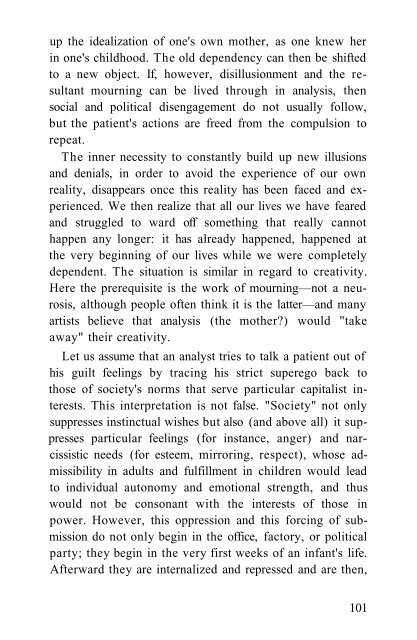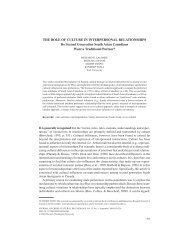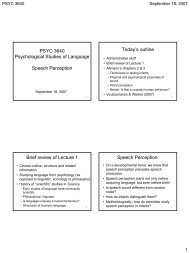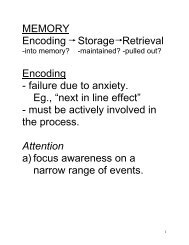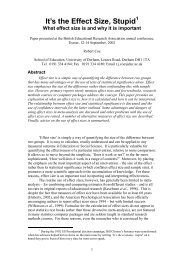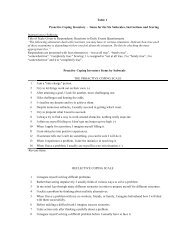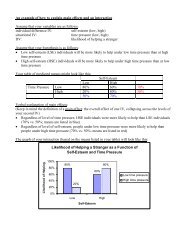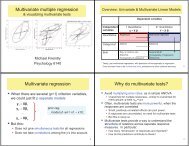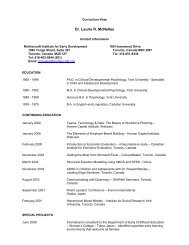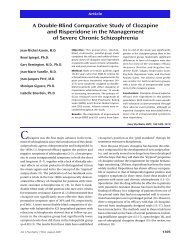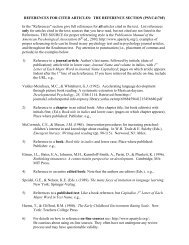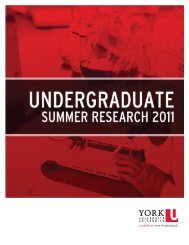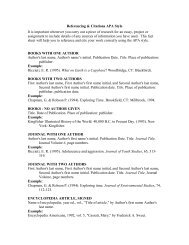The Drama of the Gifted Child (The Search for the True Self)
The Drama of the Gifted Child (The Search for the True Self)
The Drama of the Gifted Child (The Search for the True Self)
You also want an ePaper? Increase the reach of your titles
YUMPU automatically turns print PDFs into web optimized ePapers that Google loves.
up <strong>the</strong> idealization <strong>of</strong> one's own mo<strong>the</strong>r, as one knew her<br />
in one's childhood. <strong>The</strong> old dependency can <strong>the</strong>n be shifted<br />
to a new object. If, however, disillusionment and <strong>the</strong> resultant<br />
mourning can be lived through in analysis, <strong>the</strong>n<br />
social and political disengagement do not usually follow,<br />
but <strong>the</strong> patient's actions are freed from <strong>the</strong> compulsion to<br />
repeat.<br />
<strong>The</strong> inner necessity to constantly build up new illusions<br />
and denials, in order to avoid <strong>the</strong> experience <strong>of</strong> our own<br />
reality, disappears once this reality has been faced and experienced.<br />
We <strong>the</strong>n realize that all our lives we have feared<br />
and struggled to ward <strong>of</strong>f something that really cannot<br />
happen any longer: it has already happened, happened at<br />
<strong>the</strong> very beginning <strong>of</strong> our lives while we were completely<br />
dependent. <strong>The</strong> situation is similar in regard to creativity.<br />
Here <strong>the</strong> prerequisite is <strong>the</strong> work <strong>of</strong> mourning—not a neurosis,<br />
although people <strong>of</strong>ten think it is <strong>the</strong> latter—and many<br />
artists believe that analysis (<strong>the</strong> mo<strong>the</strong>r?) would "take<br />
away" <strong>the</strong>ir creativity.<br />
Let us assume that an analyst tries to talk a patient out <strong>of</strong><br />
his guilt feelings by tracing his strict superego back to<br />
those <strong>of</strong> society's norms that serve particular capitalist interests.<br />
This interpretation is not false. "Society" not only<br />
suppresses instinctual wishes but also (and above all) it suppresses<br />
particular feelings (<strong>for</strong> instance, anger) and narcissistic<br />
needs (<strong>for</strong> esteem, mirroring, respect), whose admissibility<br />
in adults and fulfillment in children would lead<br />
to individual autonomy and emotional strength, and thus<br />
would not be consonant with <strong>the</strong> interests <strong>of</strong> those in<br />
power. However, this oppression and this <strong>for</strong>cing <strong>of</strong> submission<br />
do not only begin in <strong>the</strong> <strong>of</strong>fice, factory, or political<br />
party; <strong>the</strong>y begin in <strong>the</strong> very first weeks <strong>of</strong> an infant's life.<br />
Afterward <strong>the</strong>y are internalized and repressed and are <strong>the</strong>n,<br />
101


